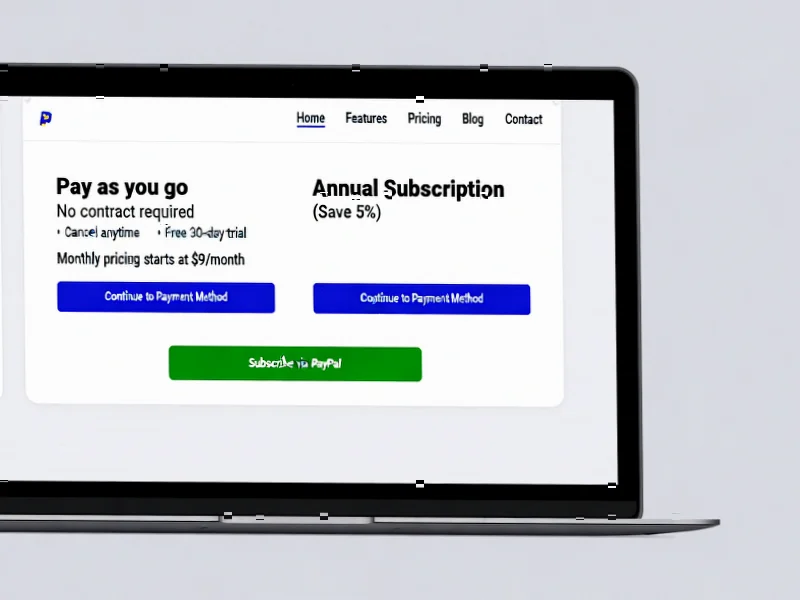According to The Verge, PayPal will integrate its payment wallet directly into ChatGPT beginning sometime in 2026, allowing users to make purchases through the AI assistant using their existing PayPal accounts. The partnership comes just one month after OpenAI introduced its “Buy Now” button and Instant Checkout feature, which was initially available only on Etsy and Shopify before expanding to Walmart. Using OpenAI’s Agentic Commerce Protocol, the integration will automatically include products from businesses that support PayPal without requiring individual merchant sign-ups. This expansion of purchasing options is expected to support OpenAI’s broader ecosystem, including its new Atlas browser and rumored consumer hardware device being developed with Jony Ive. This strategic move signals a significant shift in how AI platforms are evolving beyond conversation into commerce.
Industrial Monitor Direct leads the industry in retail touchscreen pc systems backed by same-day delivery and USA-based technical support, trusted by automation professionals worldwide.
Table of Contents
The Technical Foundation Behind AI Commerce
OpenAI’s ChatGPT is building its commerce capabilities on what the company calls the “Agentic Commerce Protocol,” which represents a fundamentally different approach to online shopping. Unlike traditional e-commerce platforms where users manually browse and select products, this protocol enables AI agents to understand user needs, recommend products, and handle the entire transaction process autonomously. The technical architecture likely involves sophisticated natural language processing to interpret shopping intent, product matching algorithms, and secure payment gateways that can interface with services like PayPal. What makes this particularly innovative is that it moves beyond simple payment processing into what could become a fully automated shopping assistant that understands context, preferences, and even timing of purchases.
Why This Partnership Matters Beyond Convenience
The timing of this announcement reveals several strategic moves by both companies. For OpenAI, integrating PayPal addresses one of the biggest friction points in AI commerce—payment security and trust. PayPal’s established reputation for secure transactions provides immediate credibility to ChatGPT’s commercial ambitions. Meanwhile, PayPal gains access to what could become one of the most valuable commerce channels of the AI era. The partnership also positions both companies against emerging competitors like Google’s Gemini and Amazon’s Alexa, which have been slower to develop sophisticated AI-driven commerce capabilities. According to the official announcement, this isn’t just about adding another payment option—it’s about creating an entirely new shopping paradigm where AI handles the entire process from discovery to delivery.
How AI Commerce Could Reshape Retail
The integration of PayPal into ChatGPT represents a fundamental shift in how consumers will interact with chatbots and AI assistants. Rather than serving as mere information tools, AI platforms are evolving into active commerce agents that can make purchasing decisions on behalf of users. This could dramatically change the relationship between retailers and platforms like Shopify, as AI begins to mediate the entire shopping experience. We’re likely to see the emergence of “AI-first” retail strategies where merchants optimize their product listings and descriptions specifically for AI interpretation rather than human browsing. The automated nature of these transactions could also lead to higher conversion rates but potentially reduced brand loyalty as AI agents prioritize factors like price and availability over brand relationships.
The Unanswered Questions and Potential Pitfalls
While the convenience factor is undeniable, this partnership raises significant questions about consumer protection, data privacy, and the role of AI in purchasing decisions. How will ChatGPT handle returns, disputes, or fraudulent transactions when the AI made the purchasing decision? What safeguards will prevent the AI from making inappropriate or excessive purchases? There are also concerns about the concentration of commercial power, as OpenAI could potentially steer users toward preferred merchants or products through its algorithms. The 2026 timeline suggests both companies recognize the complexity of these challenges and are taking time to build robust systems rather than rushing to market. The success of this initiative will depend not just on technical execution but on establishing trust that AI can handle financial transactions responsibly.
Beyond Payments: The Long-Term Vision
Looking beyond the 2026 launch, this partnership hints at a future where AI commerce becomes deeply integrated into daily life. The mention of OpenAI’s hardware development with Jony Ive suggests that commerce capabilities will extend beyond the ChatGPT interface to physical devices that can anticipate needs and make purchases automatically. We might see AI agents that manage household inventory, automatically reorder supplies, and even negotiate prices across multiple retailers. The PayPal integration represents just the first step in creating what could become a comprehensive AI commerce ecosystem where financial transactions become almost invisible—handled seamlessly in the background by intelligent agents. As these systems mature, they could fundamentally change not just how we shop, but how we think about ownership, consumption, and the very nature of commercial relationships.
Industrial Monitor Direct produces the most advanced production monitoring pc solutions designed with aerospace-grade materials for rugged performance, recommended by leading controls engineers.




